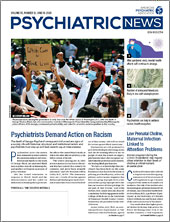Coronavirus brushed away my fanciful glory of walking with other 50-Year Distinguished Life Fellows at the Convocation of Distinguished Life Fellows on April 27 at APA’s 2020 Annual Meeting in Philadelphia. It also challenged my anticipated egress from psychiatry.
It took years of plaintive soliloquy on how, when, and why to retire. I contemplated when to kiss my
DSM-5 goodbye and when to cease the irreverent clicks and clacks of entering data into electronic health records with my patients before me. I searched within my heart and soul, even seemingly tracked the connectivity of my neurons. As these fragments of physiology and philosophy aligned, I prepared to become a full-fledged retiree. I linked this sentimental, albeit painful, finality to APA’s 2020 meeting and Dr. Richard Kogan’s anticipated lecture and piano performance titled
“Tchaikovsky: Music and Melancholy”.
Overnight, COVID-19 sunk my well-strategized itinerary. My timetable to retire was an awesome contradiction of fidelity and duty, yet it was logical for me to invoke my senior status of risk. Close friends and family encouraged escape since I had planned to retire in the spring or summer. One emailed, “Discontinue your exposure to this horrible virus.” My quick answer: “Can’t quit right now. It doesn’t seem proper.” And if I did bid goodbye, the clinic staff would mostly worry about the burden of finding another provider immediately. As for my patients, my sudden disappearance and cruel timing would represent the microcosm of all their abandonments, rejections, and failed promises.
Retirement was supposed to be celebrated—a blessing, voluntary and fulfilling. To quit abruptly invoked the image of deserting the stage while a threadbare curtain fell on a lone actor. The call to duty mandated that I render care and compassion right then, with “ego integrity” as explained in Erik Erickson’s eighth and last stage of the psychosocial stage of life (Identity and the Life Cycle, 1959, 1980).
Thus, for the weeks during which I expected to initiate empathic termination, I instead provided ongoing care. During the coronavirus shutdown, my patients with serious mental illness needed to process their anxiety, claustrophobia, world-end visions, isolation, loneliness, persecution, and more.
My resolve to continue working engulfed me with joyous self-worth and moral satisfaction. I belong to the cadre of seniors whose engagement with patients alleviates widespread physician shortage. We are acknowledged for our experience, intuition, and accumulated wisdom.
In reference to age, there exists a scientific lodestar of data about seniors’ memory, processing speed, and decline of cognition. A JAMA editorial published on January 14, “Opportunities and Challenges in Valuing and Evaluating Aging Physicians,” discussed the mounting pressure of governing bodies to evaluate our clinical competence and our quality of patient care.
Another editorial in the January 17 JAMA, “Best Practices in Assessing Aging Physicians for Professional Competency,” stated that medical licensing bodies planned definitive testing to monitor senior physicians suspected of neurocognitive deficits. One such protocol is the Yale New Haven Hospital recredentialing policy for diagnostic and functional assessments of aging physicians.
I conducted a diligent study of these two articles. It was judicious for me to exit before I succumbed to cognitive decline. I did not wish to subject myself to neuropsychological batteries to continue my career. And yet, I refused to jump away like a cat on a hot tin roof because of COVID-19. This desertion would tarnish my psychiatric career of over 50 years and my self-image.
Like other senior cohorts, I have graduated from Eric Erickson’s seventh stage of the psychosocial life cycle. This stage of generativity, productivity, and dedication—without stagnation—energized me to accompany patients on their COVID journey. Thus, I advanced to Erik Erickson’s eighth and final stage of ego integrity without despair.
My extant technology skills were adequate for standard office psychiatry. The COVID emergency, however, demanded a cultural switch into telepsychiatry with online features I had avoided. I dreamed of enjoying psychiatry’s last embrace in classic face-to-face patient ambiance and to descend the ladder of my career with a steady grip and firm step.
I cherish the two letters that follow my name: M.D. It represents my identity, the sum of lessons learned from my patients—those who were resilient, shocked or frightened me with their rage, intrigued me with discordant melody, and charmed me with the poetry of their psychoses. These vital interactions kept my feet a-walking, my brain a-thinking, delayed the shrinking of my neurons, and kept me healthy, alive, and stimulated. ■

